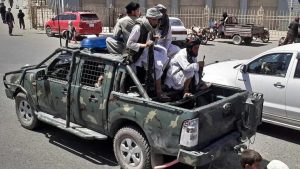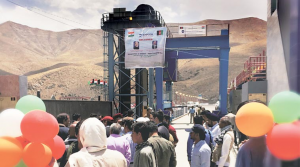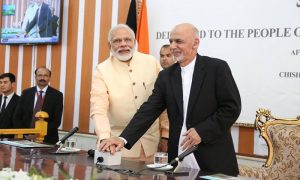India must stay the course in Afghanistan, despite short-term difficulties. While the composition of the future political setup is unclear, one cannot rule out the sudden collapse of the government in Kabul. To offset any problems in the future and secure its interests, India must deepen its engagement with all Afghan groups and not side with one to protect its vital interests, says Shakti Sinha.

The departure of the United States (US) armed forces from the Bagram airfield on July 2, brought down the curtains on the longest war the country has ever been involved with. Though US President Joe Biden had symbolically linked the final date of withdrawal to 9/11, the 20th anniversary of the worst attack on American soil, which led the US to intervene in Afghanistan, the pullout from the airbase happened earlier.
It is said that around 650 US troops are still there in Afghanistan, primarily to guard the US embassy, and have no combat role.
India, which sees a stable and independent Afghanistan as vital to its security, faces challenging times ahead. It is not that these developments in Afghanistan were unforeseen, but many Indian analysts were convinced that the Americans would never abandon the regime that they established. Thus, the US withdrawal amid a surge in the Taliban’s activities in the country has caught them by surprise.
Present Position
According to latest reports, the Taliban has conquered most of capitals of Afghanistan and are literally knocking at the gates of Kabul. The Taliban began to seize territory once the May 1 deadline (the date that the US government originally committed to completing its withdrawal under the Doha agreement) expired, and as of June 29, controls 157 districts. The rest of the districts are in various stages of contestation. A Taliban attack on the northern border river port of Sher Khan Bandar forced over 150 Afghan security forces into Tajikistan, seeking safety. Subsequently, another 300 Afghan security forces also sought refuge while surrendering large swaths of Badakhshan to the Taliban.
The recent visit of Ashraf Ghani to Washington DC was a disaster. While President Biden affirmed that the US would stay engaged with Afghanistan, there was nothing specific about supporting the Ghani regime, especially to provide air support to Afghan forces. President Ghani and his team met several former Secretaries of State, but not the current one. Secretary Antony J Blinken had made it clear months ago that President Ghani should make way for a transition government. Not to be left behind, the Pakistani army chief Qamar Javed Bajwa, accompanied by his United Kingdom counterpart, met President Ghani and reportedly assured him that they would guarantee his continuance in his office provided he outsourced Afghanistan’s security to the Pakistani army, and keep India out of Afghanistan.
India’s Interests


Realistically speaking, India’s interests in Afghanistan are limited. But they are essential. An unstable Afghanistan with ungovernable spaces was used to run training camps for terrorist groups that have targeted India. A stable and secure Afghanistan focussed on improving the lives of Afghans is in India’s interest. Such an Afghanistan would like India as a development partner and would be unlikely to be drawn into Pakistan’s conspiracies against India.
India has never sought a military alliance with Afghanistan. Its assistance to the Northern Alliance with Iran and Russia during the Afghan Civil War (1996-2001) was defensive in nature. India aimed to limit the rise of terrorist groups that threatened India. Post-2001, India has worked with whosoever is in power in Kabul, slowly establishing the proposition that India has no favourites. President Ghani’s initial steps of reaching out to China and Pakistan did unnerve many Indian analysts, but their apprehensions were unsubstantiated.
India is seen positively across Afghanistan. As friend of the country and not of any group or even regime, India must engage with all shades of opinion across the political spectrum. India’s credibility can be seen from the fact that the Taliban said that they approached India over 40 times, and former President Hamid Karzai’s answer to an interview in The Hindu that India’s outreach to the Taliban was welcome and long overdue. That said, one should not exaggerate India’s abilities, and willingness to influence domestic events in Afghanistan. All arms of the Indian government – political, developmental, intelligence and strategic – must work in sync to generate synergies.
There is a fear that if the present governance arrangement collapses in Afghanistan, Indian assets would be at risk. This is a wrong way to look at development assistance. The roads, dams, power lines, community development projects, and the parliament building may have been built by India, but they belong to the people of Afghanistan. They remain in Afghanistan irrespective of the regime and are seen by the people as their infrastructure. The positive externality is that it has contributed to building a positive image of India.
India’s Dilemma
These recent fast-changing developments have put India in a spot. On the one hand, India is still traumatised by the IC-814 hijacking in 1999, and the release of dreaded terrorists in Kandahar. The re-emergence of the Taliban post-2005 was due to Pakistani army providing safe havens, funding and logistical support. These days, even the Mullah Abdul Ghani Baradar-led Doha Shura, the negotiating arm of the Taliban, which was seen a relatively autonomous, openly fly to Pakistan to seek instructions. And yet, the Taliban were quick to counter Pakistan’s foreign minister Shah Mahmood Qureshi when he warned that the change in status of Jammu and Kashmir would adversely impact peace negotiations in Afghanistan.
Similarly, the Taliban has criticised the US-Pakistan-Turkey’s decision to give Turkey the responsibility to guard Kabul airport and the diplomatic enclave after the US withdrawal. They referred to all foreign troops as occupiers. The likelihood of the Taliban, or the Islamic Emirate as they call themselves, taking power in Kabul may not be the outcome even Pakistan desires. The four-nation grouping of China, Pakistan, Russia, and Turkey has said that they do not want the Islamic Emirate in power in Afghanistan.
While the Taliban have regretted India’s close association with what they call the “puppet Kabul regime”, they have repeatedly said that they would like India to continue to be a close development partner of Afghanistan. Unlike Ayatollah Khamenei, they have never referred to Kashmir or any other developments in India. Therefore, while scepticism of the Taliban is understandable, countries have to deal with what is, rather than what they should be.
The Indian media reported that contact had been established with the Taliban; unfortunately, this leak was premature. Subsequently, the Qataris let on that Foreign Minister S Jaishankar’s back-to-back visits to Doha were in connection with the latter’s meeting with Mullah Baradar. The Ministry of External Affairs had to deny that such a meeting took place. It is obvious that there are many forces, at different places, which are uncomfortable with any Taliban engagement with India.
IW-21-shaktisinhaHistory, one exception apart, does suggest that the Government of Afghanistan would like to have good relations with India for several reasons. One, that the two countries do not have any dispute. Two, India’s political and development experience is seen as relevant to Afghanistan.
Three, Afghans, geographically constrained, a factor that limits their space for manoeuvre strategically, see in relations with India an opportunity to exercise agency. No Afghan government would like to be seen as dependent on Pakistan. Pakistan is seen as constantly interfering in Afghan affairs, playing favourites, arming proxies, and in not allowing any Afghan regime to function normally.
The one Afghan administration that did not see any value with relations to India was the earlier Taliban regime, which was inward-looking and kept away from economic development. In the new and young Afghanistan, where a substantial portion of the population has lived outside the country, and is digitally linked with the world, any Afghan government would have to prioritise economic development. India would emerge as a partner of choice and should respond positively to such expectations and requests.
The Road Ahead
India has to stay the course, despite short-term difficulties. The closure of Indian consulates in Herat and Jalalabad in May 2020 sent a wrong signal, but was possibly unavoidable due to security grounds.
India must deepen its engagement with all Afghan groups, and not be seen as siding with one. The recent gains of the Taliban across the country are mostly happening through government troops’ negotiations or surrender.
While the composition of the future political set-up is unclear, one cannot rule out the sudden collapse of the government in Kabul, though it is unclear whether this is what Pakistan wants. Pakistan would favour a weak and insecure government in Kabul. This is not what even its erstwhile tactical partners like Iran and Russia would like. Staying calm and engaged domestically and internationally would serve India well.

(Shakti Sinha is Honorary Director, Atal Bihari Vajpayee Institute of Policy Research and International Studies, MS University, Vadodara; Distinguished Fellow, India Foundation, New Delhi; and Non-Resident Senior Fellow, Institute of South Asian Studies, Singapore. He is Distinguished Advisor, India Writes Network and India and The World magazine)
This article has also been published in India and The World magazine.
Click: For SUBSCRIPTION to INDIA AND WORLD
https://indiawrites.org/subscription-plan/
Author Profile
- India Writes Network (www.indiawrites.org) is an emerging think tank and a media-publishing company focused on international affairs & the India Story. Centre for Global India Insights is the research arm of India Writes Network. To subscribe to India and the World, write to editor@indiawrites.org. A venture of TGII Media Private Limited, a leading media, publishing and consultancy company, IWN has carved a niche for balanced and exhaustive reporting and analysis of international affairs. Eminent personalities, politicians, diplomats, authors, strategy gurus and news-makers have contributed to India Writes Network, as also “India and the World,” a magazine focused on global affairs.
Latest entries
 DiplomacyJanuary 5, 2026India walks diplomatic tightrope over US operation in Venezuela
DiplomacyJanuary 5, 2026India walks diplomatic tightrope over US operation in Venezuela India and the WorldNovember 26, 2025G20@20: Africa’s Moment – The Once and Future World Order
India and the WorldNovember 26, 2025G20@20: Africa’s Moment – The Once and Future World Order DiplomacyOctober 4, 2025UNGA Resolution 2758 Must Not Be Distorted, One-China Principle Brooks No Challenge
DiplomacyOctober 4, 2025UNGA Resolution 2758 Must Not Be Distorted, One-China Principle Brooks No Challenge India and the WorldJuly 26, 2025MPs, diplomats laud Operation Sindoor, call for national unity to combat Pakistan-sponsored terror
India and the WorldJuly 26, 2025MPs, diplomats laud Operation Sindoor, call for national unity to combat Pakistan-sponsored terror







